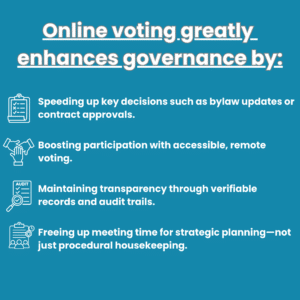Associations thrive when governance is up-to-date, transparent, and built on trust. Ensuring bylaws are current and contracts are ratified efficiently helps associations stay strategic and mission-aligned. Online voting plays a central role in streamlining these processes, but new laws like Maryland’s HB 1534 take efficiency and accountability even further.
Why Bylaw Amendments & Contract Ratifications Are Vital
Bylaws act as the blueprint for how an association operates, while contract ratification protects its legal, financial, and reputational interests. As Donna Oser, CAE, President & CEO of the Michigan Society of Association Executives, explains in a recent presentation, Strategic Board Leadership: Elevating Governance for Impact, strong governance requires regular review and alignment of these foundational elements to ensure they support the association’s mission and strategic direction.
Oser highlighted how important it can be to “schedule regular review of governing documents to keep policies relevant and aligned with the association’s mission.”
Online Voting: Your Governance Accelerator

Online voting greatly enhances governance by:
Speeding up key decisions such as bylaw updates or contract approvals.
Boosting participation with accessible, remote voting.
Maintaining transparency through verifiable records and audit trails.
Freeing up meeting time for strategic planning—not just procedural housekeeping.
As Oser emphasizes in her presentation: “Association governing bodies – like boards and delegate assemblies – should spend their valuable and limited time together using information in decision-making—not collecting it.”
Spotlight on Maryland HB 1534: Third-Party “Good Governance”
Maryland’s newly enacted HB 1534 (effective October 1, 2025) mandates enhanced election integrity measures and transparency for condos and HOAs. Key provisions include:
- Independent Election Oversight
Elections for governing bodies must now be conducted by “independent parties” (individuals or entities who are not candidates and have no conflicts of interest). Property managers typically do not qualify. Eligible independent parties include unit owners (who meet certain criteria) or third-party vendors and technology platforms. - Access to Records Without Cost Barriers
Associations cannot charge owners for examining financial statements in person or receiving them electronically. Reasonable fees may only apply if statements are stored in a depository. - Enforcement by Attorney General
Violations of election or transparency provisions fall under the jurisdiction of the Office of the Attorney General’s Consumer Protection Division.
This legislation strengthens governance by mandating impartiality in elections and ensuring easy, affordable record access—key tenets of “good governance.”
Why This Matters—and How Online Voting Aligns
HB 1534’s requirement for independent election administrators aligns perfectly with the use of secure online voting platforms, which can serve as impartial, efficient third-party conduits. These platforms:
- Eliminate managerial bias by automating election processes.
- Ensure fairness through clear, standardized vote collection and counting.
- Provide audit-ready records, reinforcing transparency and compliance with the new law.
Moreover, when bylaws or contracts need updating—especially with voting under third-party oversight—online platforms offer seamless integration for proposals, pre-vote communications, and vote tabulation.
Governance + Technology + Law = Well-Run Associations
By harmonizing strong governance practices (like regular bylaws and contract review) with legal requirements (HB 1534), and leveraging technology (online voting platforms), associations can:
- Achieve faster, more equitable decision-making.
- Maintain public trust through transparency and accountability.
- Stay agile and resilient in a changing regulatory and operational environment.
Additionally, aside from creating proper division of duties between Board and Staff activities, Oser highlights a few key practices and tips to keep in mind when working to elevate association governance and leadership:
- Be clear about roles and responsibilities
- Tip: Facilitate the development of a Board Handbook, outlining duties, policies, and expectations.
- Recruit and train strategically
- Tip: Encourage the development of and use leadership pipelines to identify and prepare future board leaders.
- Strengthen communication and collaboration
- Tip: Work with board leadership to create a board-staff partnership agreement that defines communication protocols and decision-making processes.
- Support effective governance practices
- Tip: Embrace term limits and succession planning to maintain board effectiveness and prevent stagnation.
- Engage the Board in meaningful work
- Tip: Set aside time at every meeting for exploration and discussion on a topic strategic to the industry or profession.
- Use technology to improve efficiency
- Tip: Schedule shorter, more focused meetings with pre-read materials to improve engagement and decision-making.
- Address conflict and challenges promptly
- Tip: Use board development workshops to train members in effective governance and conflict resolution.
The Governance Payoff
When bylaws and contracts are reviewed and approved efficiently, boards can focus on what truly matters: advancing the mission, serving members, and adapting to industry change.
Strong board leadership, according to Oser’s presentation, requires:
“A culture of self-assessment and accountability, a healthy attention to board member recruitment and development, and a strong strategic orientation”.
Online voting supports all three by enabling a nimble, responsive governance structure.
Sources:
2025 CAI Maryland Legislative Session Report
Client Alert: New Maryland Law Affecting Condominium and Homeowner Associations
2025 Regular Session- Maryland General Assembly
Strategic Board Leadership: Elevating Governance for Impact – A presentation from the Michigan Society of Association Executives (MSAE) President & CEO Donna Oser, CAE
